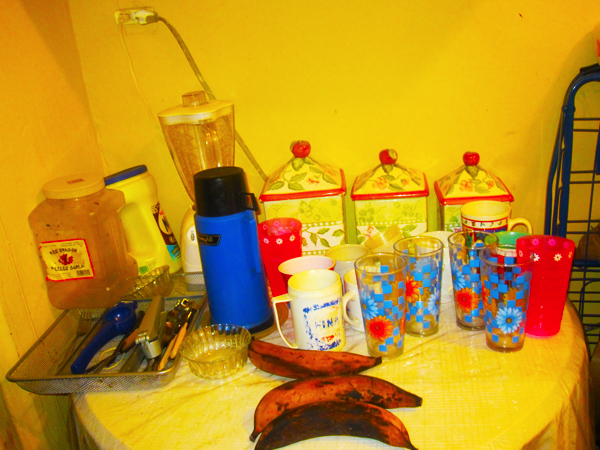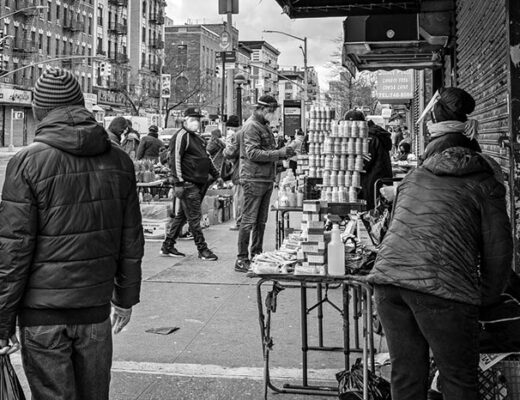Words: Riquelmy Sosa
View this post on Instagram
In the summer, I spent my Saturdays lounging in an unbalanced brown and ivory couch covered in plastic that was squeezed beneath a corner window. It belonged to Tia Mari, Tia Alba, and probably Tio Ernesto too before it took up space in our living room. Its chipped wooden legs would glow with the reflection of the sun and formed an Old Western pattern that matched its embroidery across the living room floor. Sometimes when I was bored, I made pretend that we were country people living somewhere out on the prairie. Mostly, though, I read books I stole from my brother, who was more interested in girls and his non-existent rap career, than graduating high school. Or I would listen to the fiery, loud-ass adult conversations that spewed over tiny cups of Bustelo. No lie, there was so much bulla, our neighbors called the cops more than a few times. They swore we were always on the verge of killing each other. I habitually sat there, on that deformed couch, for hours with the plastic clinging to my skin forcing me to sit still. If I moved too much, I would have to wipe the puddles of sweat that formed under my thighs. This would irritate my flow of getting lost in the white picket fences and perfectly manicured lawns in my books or worse yet, Mami would notice that I was comiendo boca and give me that look that wrecked terror on my insides. It was a Saturday afternoon, just like this one, when I first heard him three stories down on the stoop.
I knew all the dudes that threw away their lives, as Papi would say, on the three gray steps with chunks of missing concrete, in front of the building door. We grew up together, in a sense, we lived on the same street. But my dad had a friend from the embassy back in D.R. who bribed himself into the NYC school board. He squeezed me across zone lines to the Blue Ribbon public school on the other side by Central Park. So I didn’t spend much time with those dudes, well really, with no one within a ten-block radius of our block. Plus my dad never let me hang out on the stoop. I routinely tuned them out and kept my focus on the possibilities hidden in my books. That day, though, in between their noise about the fight that went down at the newest after-hours spot, the hoes that were picked up and brought back to Jose’s crib, and the negotiations with crackheads trading stolen goods for drugs, I caught the sultry notes of an unfamiliar semi-deep voice. It strangely made me feel like home. I bent over the window guards and saw a new body frame leaning on the iron gates next to the building. I tried hard to see his face without plummeting to the concrete and having my brain painted all over the sidewalk, but it was covered with a blue Yankee fitted slightly tilted above his long black hair. Without much thought, I walked towards the door and shouted behind me for my mom to know that I was grabbing a drink from the store.
On those rare occasions I ventured outside, I invisibly slipped past the stoop huggers; not because I feared an ass-whooping from my dad but I barely understood them and I doubted they wanted to dissect Emily Dickinson’s poetry with me. This time was no different except I walked slower hoping for a chance to match the voice with the face under the hat. As they grabbed their cups filled with dark liquid and shifted for me to walk down the middle of the steps, I heard him ask Jose, “yo, who’s that?” to which he received a response that made my blood retreat a little, “Don’t even waste your time, bro, that chick is a come mierda.” That didn’t sit well. I decided against the walk to the bodega and instead stopped by Don Manuel’s cart on the corner to grab a piragua. Before I could choose my flavor, dude with the alluring voice, was behind me. The Jean Paul Gaultier, the one my brother was always begging my parents to buy, lifted from his pores. His slightly chiseled chest glistened under the outlines of his wife beater and his pants were a bit low but not annoyingly so; if he had to run away from the cops, I imagined he wouldn’t trip over them. “You should get tamarindo. It’s the best one,” he told me with a soft smile that revealed a slightly crooked front tooth. I hated tamarindo and much preferred limón or fresa, but I just nodded. I noticed his clean, perfectly outlined fingernails as he gave Don Manual a dollar and told him, “yo pago por ella”. Turning to me, he asked my name, and said que le de vuelta a la manzana with him. In between anxious bites of the shaved ice melting into the piragua, I nodded again.
That summer, we walked around the neighborhood all the time. We usually met at Mama’s Pizzeria on 105th and ate a lot of pizza with grape slushies and cherry Italian ices. In between bites, he would tell me stories about living in D.R. that left me slightly jealous: the palm trees, the fruits, the freedom. We would talk about stuff I only read in my school books — existentialism and Plato’s cave — in crazy Spanglish; him more Spanish and me in English. He did that a lot; bring up topics that I never expected him to know or even comprehend. He even knew about these Dominican women I never heard of — Yolanda Cruz and Aida Cartagena Portalatin. When I first read him my poetry, he told me it reminded him of Salomé Ureña. I pretended to at least know her. Whenever we weren’t talking about the stuff no one else cared about, he would teach me how to bag up and move weight. On his slow days, we would ride the train to the record shops in the village or he would take me to Riverside and teach me how to roller-skate on the ramps. We managed to be together constantly except when he had to serve customers or take long trips to pick up his work. My parents never found out about us. They didn’t really press me much. I think they were just glad that I was seeing daylight other than through our living room window. I heard them in their room, one time, saying they were scared I would end up a nun, since all I knew was how to keep my face buried in books. Even so, we always made sure not to venture past Broadway. I couldn’t risk them or any of their nosey-ass friends catching wind of me hanging out with a tiguere and especially not one that wasn’t blonde, blue-eyed with loads of money and lived far away from our neighborhood.
“You got played, girl,” Raisa, my god-sister, told me pacing back and forth, as if she was prepping for a fight. It was the third week in August and she had walked with me to the pizzeria before heading to the salon on the next block. She needed to get her hair done for her baby sister’s bautizo. I was waiting on him to come meet me, same as every other day, but an hour had already passed. I kept looking at the green beeper he bought me and prayed that it would vibrate on my hip. “How about if something happened to him?” I asked her. “Ain’t shit happen to him, ma. Yesterday, you told him you pregnant and today he’s nowhere to be found. C’mon, no se pendeja, stupid.” She was trying real hard to school me. I wasn’t listening. I shared with her how he was beyond excited. He told me stories about his dead-beat dad and how that would never be him. He was going to move with me to Connecticut, soon as he saved up more money, so that I could still leave to college the following week. He would stay home with the baby. Matter of fact, we were going to 34th street that day for him to buy me clothes and everything I needed for my temporary dorm. Raisa wasn’t convinced. “Ok, if you say so, she said, as she rolled her eyes, I don’t want to leave you here, though, en ete maldito calor. Wait at the salon with me, at least there’s air conditioning there.” I looked down at my hip and walked away with her.
At the salon, I kept telling myself that he got caught up and would find me soon. I refused to think that something awful happened to him. After an hour of nervously peeling my lip and twisting my thoughts, I overheard one of the women mention his name. She was leaning over the lady in her chair, stretching out her hair con un peine de punta and sliding it onto bright colored rollers. She balanced the phone between her chin and ear as she spoke, “pero amiga, Santa no te digo lo que le pasó eta madrugada. Se le tiraron en su casa. No, el no etaba ahí. Parece que etaba jangueando. Ella tuvo que manda ese muchacho de una ve pa Santo Domingo. Tú te imagina, que le quiten la Sección 8. No, no puede se. Que bregue su mama allá con él.” I felt waves of nausea hitting the creases in my throat. I ran out of there with her words ringing in my ear. I bent over the grates in the sidewalk and threw up heart fragments mixed with my breakfast. Afterwards, I sat down on the curb with sweat beads covering every inch of my body. I didn’t move. I just stood there with the sun burning lesions onto my skin. I couldn’t breathe. But it was impossible to think of it all right then and there; he left with my future clenched in his hands. I left all that for another day.
Related:
We invite you to subscribe to the weekly Uptown Love newsletter, like our Facebook page and follow us on Twitter & Instagram or e-mail us at [email protected].



